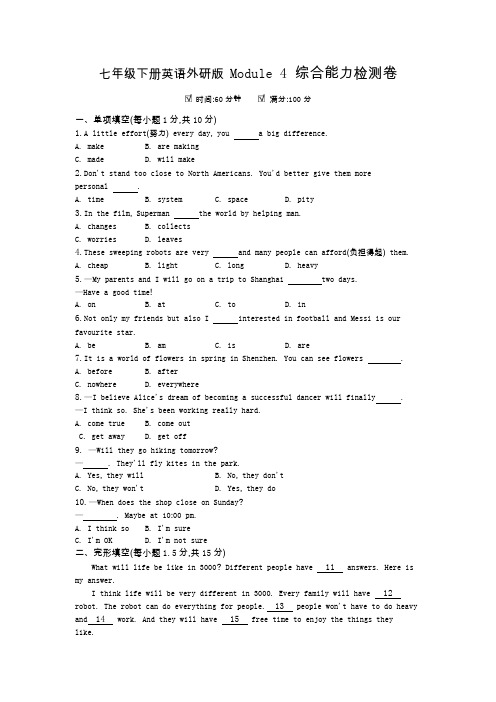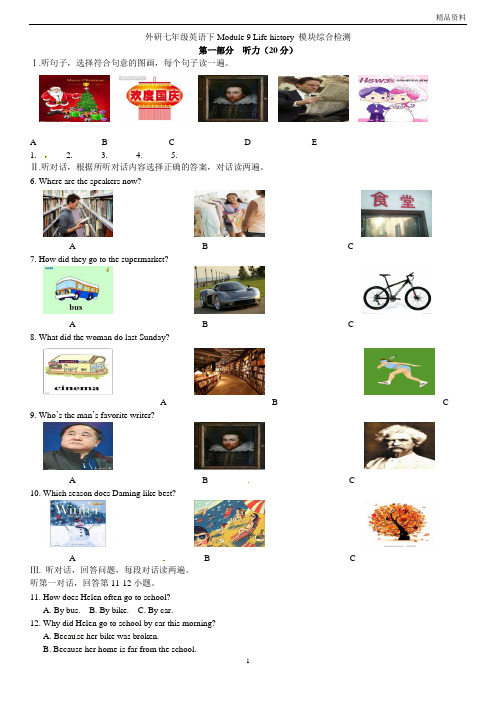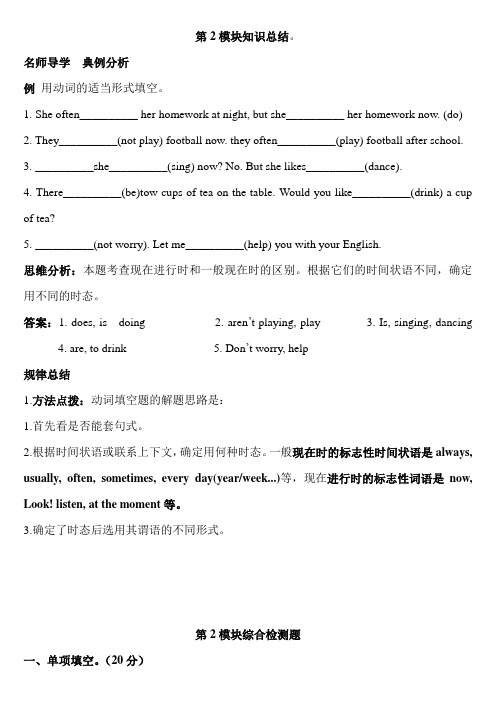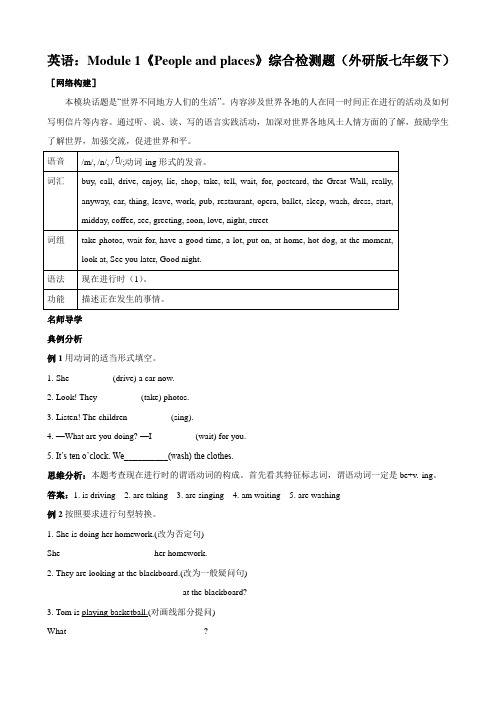英语外研版七年级下册(新)本模块综合练习
外研版七年级英语下册各模块语法知识汇总+专项练习

外研版七年级英语下册各模块语法知识汇总+专项练习M1 形容词性和名词性物主代词专项练物主代词分为两种:形容词性物主代词和名词性物主代词。
形容词性物主代词不能单独使用,后面必须跟名词,例如:We are doing our XXX(我们正在做家庭作业。
)名词性物主代词则具有名词的性质,可以单独使用,例如:My shirt is black。
but yours is white.(我的衬衫是黑色的,但你的是白色的。
)名词性物主代词也可以具有“形容词性物主代词+名词”的作用,例如:Whose comb is it。
It’s hers.(hers=her+comb)下面是物主代词的对照表:物主代词 | 形容词性 | 名词性 |我的 | my | XXX |你的 | your | yours |他的 | his | his |她的 | her | hers |它的 | its | its |我们的 | our | ours |你们的 | your | yours |他们的 | their | theirs |需要注意的是,名词性物主代词可指一件东西,也可指很多件东西,需要根据上下文来决定。
例如:选择填空:1.This is my teapot。
It’s not __________。
(your/ yours)2.My hairdryer is on the desk。
Where’s ____________?(her/ hers)3.___________ hairdryer is not on the table。
___________ is there。
(Her/ Mine)4.Whose calculator is it?It’s __________。
It’s __________ XXX)5.Are they ___________ (your/ yours) combs。
Yes。
they’re _________(our/ ours).用所给词的适当形式填空:1.That is not _________ kite。
七年级英语外研版下册模块综合检测题(Module1_People_and_places)附答案

[网络构建]本模块话题是“世界不同地方人们的生活”。
内容涉及世界各地的人在同一时间正在进行的活动及如何写明信片等内容。
通过听、说、读、写的语言实践活动,加深对世界各地风土人情方面的了解,鼓励学生了解世界,加强交流,促进世界和平。
/m/, /n/, //;典例分析例1用动词的适当形式填空。
1. She__________(drive) a car now.2. Look! They__________(take) photos.3. Listen! The children__________(sing).4. —What are you doing? —I__________(wait) for you.5. It’s ten o’cloc k. We__________(wash) the clothes.思维分析:本题考查现在进行时的谓语动词的构成。
首先看其特征标志词,谓语动词一定是be+v.-ing。
答案:1. is driving 2. are taking 3. are singing 4. am waiting 5. are washing例2按照要求进行句型转换。
1. She is doing her homework.(改为否定句)She __________ __________ her homework.2. They are looking at the blackboard.(改为一般疑问句)__________ __________ __________at the blackboard?3. Tom is playing basketball.(对画线部分提问)What __________ __________ __________?思维分析:现在进行时的谓语动词的构成是:助动词be+v.-ing,在变为否定或疑问句时,be后加not变为否定句,把be提前变为一般疑问句。
七年级下册英语外研版 Module 4综合能力检测卷

七年级下册英语外研版Module 4综合能力检测卷时间:60分钟满分:100分一、单项填空(每小题1分,共10分)1.A little effort(努力) every day, you a big difference.A. makeB. are makingC. madeD. will make2.Don't stand too close to North Americans. You'd better give them morepersonal .A. timeB. systemC. spaceD. pity3.In the film, Superman the world by helping man.A. changesB. collectsC. worriesD. leaves4.These sweeping robots are very and many people can afford(负担得起) them.A. cheapB. lightC. longD. heavy5.—My parents and I will go on a trip to Shanghai two days.—Have a good time!A. onB. atC. toD. in6.Not only my friends but also I interested in football and Messi is our favourite star.A. beB. amC. isD. are7.It is a world of flowers in spring in Shenzhen. You can see flowers .A. beforeB. afterC. nowhereD. everywhere8.—I believe Alice's dream of becoming a successful dancer will finally.—I think so. She's been working really hard.A. come trueB. come outC. get awayD. get off9.—Will they go hiking tomorrow?—. They'll fly kites in the park.A. Yes, they willB. No, they don'tC. No, they won'tD. Yes, they do10.—When does the shop close on Sunday?—. Maybe at 10:00 pm.A. I think soB. I'm sureC. I'm OKD. I'm not sure二、完形填空(每小题1.5分,共15分)What will life be like in 3000? Different people have 11 answers. Here is my answer.I think life will be very different in 3000. Every family will have 12 robot. The robot can do everything for people.13 people won't have to do heavy and14 work. And they will have 15 free time to enjoy the things theylike.People will wear special 16 in 3000. They don't have to 17 clothes because they won't get dirty. There will be more kinds of foods for people to enjoy. And they are18 healthy food.People will use energy(能源) from the sun and the wind. So there won't be any pollution problems.People will use a special car to travel. It can run on the road and 19 in the air. It will be very 20 for people to travel to the moon and other planets. Some people will live on other planets.It will be a happy world in 3000.11.A. same B. differentC. manyD. some12.A. a B. anC. theD. /13.A. With B. SoC. ButD. Since14.A. light B. funnyC. interestingD. dangerous15.A. less B. fewC. moreD. many16.A. shoes B. glovesC. hatsD. clothes17.A. have B. wearC. washD. make18.A. every B. bothC. noD. all19.A. walk B. flyC. climbD. sleep20.A. easy B. difficultC. hardD. far三、阅读理解(每小题2分,共30分)A"Billy, one, two, three, get up! It is 25th February, 2099, seven o'clock. It's time to get up and go to school," says the clock-robot in a loud voice. Then the clothing-robot dresses(给……穿衣服) Billy quickly. Next the kitchen-robot gives Billy some bread and eggs. Billy doesn't like them, and the kitchen-robot gives him a hamburger. After eating the hamburger, Billy goes to school. When he gets out of the house with his schoolbag, he sees a car-robot waiting for him."Hello! I will drive you to school. Your name is Billy, isn't it?" asks the car. "Right,"Billy answers. "Now would you please show me your school ID card?" says the car. Billy shows it his school ID card. "Get in, please." Billy gets in it. Then the car goes on, "I will check your homework today. Please take it out." Billy does as the car-robot says. When they get to school, the car says to Billy,"See you, Billy. Good luck!"21.The dresses Billy every morning.A. clock-robotB. car-robotC. kitchen-robotD. clothing-robot22.Billy has for breakfast.A. some breadB. some eggsC. a hamburgerD. an orange23. sends Billy to school.A. A driverB. A busC. The car-robotD. The bus-robot24.Before getting in the car, Billy shows his to the car-robot.A. homeworkB. ticketC. school ID cardD. schoolbag25.Which of the following is TRUE according to the passage?A. Children don't need to do their homework in 2099.B. There are all kinds of robots in 2099.C. Robots cannot drive cars for people in 2099.D. People don't eat anything for breakfast in 2099.BLinda,I guess that I will work in ten years, but I don't know what job I will do, maybe a reporter(记者) or a singer. But I can tell you what I'll do next week —celebrate(庆祝) my eleventh birthday with my classmates. I'm so busy enjoying mylife and I have no time to worry about the future!Emma,There's one thing I really want to do and that is to travel around the world. I hope I will live somewhere different in ten years — somewhere really interesting like Australia, or even Japan — Who knows? I'd like to be a teacher and maybe I'll teach English after leaving college(大学).Mary,I'm not really sure about the future. I know that I'm going to college and I also think that I will get married sometime in ten years. I'd like to have a family and I want to have an interesting job as well. I'm interested in writing, so I may work as a writer.26.What do you think Linda may be now?A. A reporter.B. A singer.C. A student.D. A worker.27.What will Linda do next week?A. She will have a maths exam.B. She will work as a reporter.C. She will have a birthday party for herself.D. She will take part in her friend's birthday party.28.What does Emma want to be in ten years?A. She wants to be a reporter.B. She wants to be an English teacher.C. She wants to be a singer.D. She wants to be a writer.29.From the passage we know Mary .A. has no plans for her futureB. will get married at the age of twentyC. wants to be a writer in the futureD. will travel around the world30.What can we learn about the three people mentioned in the passage?A. Linda is too busy and has no time to study.B. Emma thinks Australia and Japan are interesting places.C. Mary thinks she will live alone in ten years.D. Emma will live in her home town in ten years.CWhat will the world of the future be like? There are plenty of people who are happy to give their opinions of what we will be doing in 2050. Here are two predictions(预测) about the world of tomorrow.When we dream about the future, many like to think of owning a personal flying car. The advantages are obvious(明显的). This technology would allow total freedom of movement. We could fly at 480 km per hour, avoiding(避免) traffic lights and busy roads. However, some people believe there will be problems with traffic control. If the cars become popular, there is likely to be an air traffic jam. Another big problem is mechanical (机械的)failure. What will happen if the cars stop working? These are problems we must expect (预期)if flying cars become a reality(现实).Three-dimensional printing is another new technology with exciting possibilities. 3D printers are used to build an object with liquid plastic. They build the object layer by layer until it is complete. Car companies already use 3D printers to make life-size models of car parts, and medical companies use the technology to make man-made body parts. As we move into the future, 3D printing will revolutionize (彻底改变)the way we shop, the way we manufacture products and the way we treat sick people. The disadvantage is that such equipment will be extremely expensive.So in the future, we might be able to fly to work or print out new shoes in our daily life. Although there are some problems to solve before this will be possible, we can certainly dream of a world where technology makes life easier and safer for millions of people.31.What is the passage mainly about?A. Environmental protection.B. The world of tomorrow.C. Advantages of technology.D. History of the world.32.What do we learn from the passage?A. There may be no traffic lights on busy roads in the future.B. Some people think technology development may bring new problems.C. 3D printing can bring great changes to our life and its equipment is cheap.D. The flying cars won't bring the air traffic jam even when they become popular.33.What is the correct structure of the passage?(P1=Paragraph 1)34.What does the underlined word "They"refer to?A. Car companies.B. Body parts.C. 3D printers.D. Liquid plastic.35.We can infer that the writer about the future life with technology.A. doesn't careB. can't imagineC. feels disappointedD. feels hopeful四、从方框中选择最佳选项补全对话(有两项多余)(每小题1分,共5分)A: Hi, John.36B: Hi, Mary. I think the world will be very different from now.A: In what way?B: Well, take education for example. 37A: Maybe there won't be any classes. And there may not be teachers any more!B: Maybe not... 38 It's better to learn from teachers.A: Yeah, you might be right. I wonder how students will go to school. 39B: Cool. Just like in the movies. Oh, but I just have another idea.A: What?B: 40A: Right, just like in the streets now!五、任务型阅读(每小题2分,共10分)Artificial intelligence (AI)(人工智能) is growing rapidly. We are living in a world that depends more and more on AI. AI is a group of technologies that help machines get, understand and use information to do tasks.AI's recent developments(发展) have got a lot of social attention. Some people have welcomed AI because it makes things possible. For example, AI will have a big influence on areas like medicine and engineering. But this attention has also produced a lot of fear. Especially, many workers are worrying that AI could make them lose their jobs.According to a recent study, nearly five percent of jobs will disappear(消失) because of AI. In some industries, AI is already doing the work that people used to do, such as assembling (装配) cars, digging the coal and lifting goods. Self-driving cars and trucks controlled by AI will also take away the drivers' jobs in the future.On the other hand, AI will also create many new jobs for people. More peoplewill be needed to write programmes for AI systems (系统) and they will set up and work on them too. Meanwhile, jobs that require feelings, excellent communication skills with people will not be replaced (取代) by AI. These include jobs in fields like teaching, nursing and personal training.AI is here. It is changing how people live and work in many ways. That makes AI important for our life.41~42题完成句子;43题简略回答问题;44题找出并写下第二段的主题句;45题将文中画线句子译成汉语。
新 外研七下练习Module7 Unit3综合自测题(附答案)

外研版英语七年级下册Module7-U3综合自测题一、单项选择1. Mr Green will give us a talk ________ how to learn English this weekend.A. onB. atC. toD. of2. My parents often go to the movies________ Saturday evenings. 【中考·黔南】A. onB. inC. forD. at3. We go to school________ Monday to Friday every week. 【中考·百色】A. atB. forC. onD. from4. There are many interesting books ________ in the school library.A. readsB. readingC. to readingD. to read5. It is great ________ in the river in summer.A. to swimB. swimC. swimsD. to swimming6. —When did Neil Armstrong walk on the moon?—________July 20th, 1969. 【2019·内江】A. InB. AtC. ForD. On7. Who's that man ________ sunglasses?A. onB. forC. ofD. with8. Ten years ________, there were some old houses in the village, but now there aren't any.A. agoB. laterC. beforeD. already2. These boys come from Japan. They________ born in 1995.3. The people are looking forward to________ Jimmy Lin very much.4. Tony was________ at school and it made his parents very angry.5. There was a strong wind________ night.三、根据汉语提示完成句子1. 这个村庄在中国的东海岸。
外研版七年级英语下册Module9模块综合检测试卷含答案

外研七年级英语下Module 9 Life history 模块综合检测第一部分听力(20分)Ⅰ.听句子,选择符合句意的图画,每个句子读一遍。
A B C D E1.______2.______3.______4.______5.______Ⅱ.听对话,根据所听对话内容选择正确的答案,对话读两遍。
6. Where are the speakers now?A B C7. How did they go to the supermarket?A B C8. What did the woman do last Sunday?A B C9. Who’s the man’s favorite writer?A B C10. Which season does Daming like best?A B CⅢ. 听对话,回答问题,每段对话读两遍。
听第一对话,回答第11-12小题。
11. How does Helen often go to school?A. By bus.B. By bike.C. By car.12. Why did Helen go to school by car this morning?A. Becau se her bike was broken.B. Because her home is far from the school.C. Because her father drove to meet her math teacher.听第二段对话,回答第13-15小题。
13. What does Susan’s father do now?A. A teacher.B. A farmer.C. A hotel manager.14. Was Susan’s father very rich when he was young?A. Yes, he was.B. No, he wasn’t.C. We don’t know.15. What did her father often do in his free time?A. He often played cards.B. He often watched TV.C. He often played chess.Ⅳ. 听独白,根据所听内容选择正确答案,独白读两遍。
七年级英语外研版下册模块综合检测题(Module2_Spring_Festival)附答案

第2模块知识总结。
名师导学典例分析例用动词的适当形式填空。
1. She often__________ her homework at night, but she__________ her homework now. (do)2. They__________(not play) football now. they often__________(play) football after school.3. __________she__________(sing) now? No. But she likes__________(dance).4. There__________(be)tow cups of tea on the table. Would you like__________(drink) a cup of tea?5. __________(not worry). Let me__________(help) you with your English.思维分析:本题考查现在进行时和一般现在时的区别。
根据它们的时间状语不同,确定用不同的时态。
答案:1. does, is doing 2. aren’t playing, play 3. Is, singing, dancing4. are, to drink5. Don’t worry, help规律总结1.方法点拨:动词填空题的解题思路是:1.首先看是否能套句式。
2.根据时间状语或联系上下文,确定用何种时态。
一般现在时的标志性时间状语是always, usually, often, sometimes, every day(year/week...)等,现在进行时的标志性词语是now, Look! listen, at the moment等。
3.确定了时态后选用其谓语的不同形式。
第2模块综合检测题一、单项填空。
(20分)1. Here is the eraser. Give__________.A. me itB. it himC. it to him答案:C 解析:give sb. sth就相当于give sth to sb,但是当间接宾语是人称代词时,只能用give sth. to do sb。
英语:Module 1《People and places》综合检测题(外研版七年级下)

英语:Module 1《People and places》综合检测题(外研版七年级下)[网络构建]本模块话题是“世界不同地方人们的生活”。
内容涉及世界各地的人在同一时间正在进行的活动及如何写明信片等内容。
通过听、说、读、写的语言实践活动,加深对世界各地风土人情方面的了解,鼓励学生了解世界,加强交流,促进世界和平。
/m/, /n/, /名师导学典例分析例1用动词的适当形式填空。
1. She__________(drive) a car now.2. Look! They__________(take) photos.3. Listen! The children__________(sing).4. —What are you doing? —I__________(wait) for you.5. It’s ten o’clock. We__________(wash) the clothes.思维分析:本题考查现在进行时的谓语动词的构成。
首先看其特征标志词,谓语动词一定是be+v.-ing。
答案:1. is driving 2. are taking 3. are singing 4. am waiting 5. are washing例2按照要求进行句型转换。
1. She is doing her homework.(改为否定句)She __________ __________ her homework.2. They are looking at the blackboard.(改为一般疑问句)__________ __________ __________at the blackboard?3. Tom is playing basketball.(对画线部分提问)What __________ __________ __________?思维分析:现在进行时的谓语动词的构成是:助动词be+v.-ing,在变为否定或疑问句时,be后加not变为否定句,把be提前变为一般疑问句。
外研版英语七年级下册全册模块检测卷(附答案)

初中英语外研版七年级下册Module1 Lost and found单元练习一、听力(共20小题;共20分)Ⅰ. 听句子,选择恰当的答语。
每个句子读一遍。
1. A. Red. B. Small. C. A T-shirt.2. A. Yes, they will. B. Yes, they do. C. Yes, they are.3. A. It's famous.B. It's next to the railway station.C. It has lots of paintings.4. A. No, I can't. B. I like cooking. C. Don't worry.5. A. They're blue. B. It's Tony's. C. They're mine.II. 听对话及问题,选择正确答案。
每段对话及问题读两遍。
6. A. To the bookshop. B. To the restaurant. C. To the park.7. A. A park. B. A supermarket. C. A police station.8. A. They will go to hospitals.B. By using computers.C. By using phones.9. A. Betty's. B. Sally's sister's. C. Sally's.10. A. Some apples. B. Some lemons. C. Some bananas.III. 听短文,选择正确答案。
短文读两遍。
11. The speaker is going to Shanghai next .A. FridayB. SaturdayC. Sunday12. It's often in Shanghai.A. windyB. sunnyC. rainy13. There is a(n) in the speaker's wallet.A. photoB. air ticketC. guidebook14. A of the speaker is living in Shanghai.A. sisterB. cousinC. friend15. The speaker will arrive in Shanghai at am.A. 4:00B. 5:00C. 6:00IV. 听短文,选择正确答案完成表格。
- 1、下载文档前请自行甄别文档内容的完整性,平台不提供额外的编辑、内容补充、找答案等附加服务。
- 2、"仅部分预览"的文档,不可在线预览部分如存在完整性等问题,可反馈申请退款(可完整预览的文档不适用该条件!)。
- 3、如文档侵犯您的权益,请联系客服反馈,我们会尽快为您处理(人工客服工作时间:9:00-18:30)。
Module1 Unit 3 Language in use
教学目标 1. 能正确运用本模块重点单词、短语和句型。
There is /are.... Here is /are.... Please be careful with.... Whose bag is this?
2. 能正确使用名词性物主代词。
3. 能听懂有关失物招领的对话、短文;能写失物招领及寻物启事。
重点Aim I ,Aim III难点Aim II
【预习任务展示设计】
一、默写下列短语及句子汉字后填写英文
欢迎大家回到学校!
首先,
来看一下失物招领箱
许多东西
这是谁的包?
这些蜡笔是你的吗?
这些是谁的磁带?是我的。
.
这有一个紫色的钱包
看这块漂亮的手表。
从现在开始,
请小心保管好自己的物品。
这有一些好看的手套。
欢迎来到纽约
在失物招领处
寻找他的相机
上公交车
丢东西
赶时间,匆匆忙忙
将东西落在飞机
成百上千的
许多其它的东西
目前
一些奇怪的东西
15公斤香肠
他们是你的吗?
二、人称代词及物主代词(完成并熟记)
第一人称第二人称第三人称
单数人称代词主格宾格
复数人称代词主格宾格
单数物主代词形容词性名词性
复数物主代词形容词性名词性。
